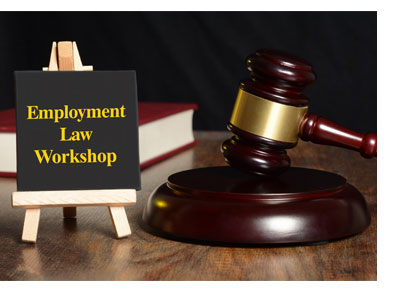 |
THIS ISSUE'S HEADLINES
General Assembly Eliminates “Open and Obvious” as Complete Defense to Personal Injury Claims
What is “Shadow Preferred Stock” and When Should it be Used?
“Navigating the Interplay of FMLA, ADA & Workers’ Comp” Workshop – Register Today

GENERAL ASSEMBLY ELIMINATES “OPEN AND OBVIOUS” AS COMPLETE DEFENSE TO PERSONAL INJURY CLAIMS
In legislation approved by the Governor on July 15, 2019, the General Assembly amended section 9-20-4 of the General Laws (the Comparative Negligence statute) such that the open and obvious defense to personal injury claims can no longer act as a complete bar to recovery. Previously, when a plaintiff voluntarily exposed himself or herself to the perils of an open and obvious danger, there was no duty of care imposed on the defendant. Stated differently, a defendant had no obligation to safeguard a plaintiff against personal injuries when that plaintiff exposed themselves to an open and obvious danger.  Part of the reason for this bar to recovery was that open and obvious dangers are considered so evident that “any warning would be superfluous for an ordinarily intelligent plaintiff,” and thus, it would not be reasonable to hold a defendant liable for injuries sustained by a plaintiff opting to encounter the obvious danger. See Papadopoulos v. Target Corp., 930 N.E.2d 142, 151 (Mass. 2010). Part of the reason for this bar to recovery was that open and obvious dangers are considered so evident that “any warning would be superfluous for an ordinarily intelligent plaintiff,” and thus, it would not be reasonable to hold a defendant liable for injuries sustained by a plaintiff opting to encounter the obvious danger. See Papadopoulos v. Target Corp., 930 N.E.2d 142, 151 (Mass. 2010).
With the change of the General Laws, defendants can no longer rely on the open and obvious danger defense as a complete bar to recovery. Rather, with the placement of the amendment within the Comparative Negligence statute, it appears that the open and obvious defense should factor into the determination as to whether a plaintiff was comparatively negligent, and if so, the percentage by which any award should be reduced. For plaintiffs, this legislation is welcomed news, as more claims are likely to survive summary judgment motions and make their way to juries; the flip side is that defendants have been stripped of an available defense to dispose of claims short of trial. For further information on the new law or related legal issues, please contact Attorney Patrick J. McBurney at 401-824-5100 or email pmcburney@pldolaw.com.
[back to top]

WHAT IS “SHADOW PREFERRED STOCK” AND WHEN SHOULD IT BE USED?
The use of convertible promissory notes or, in recent years, “SAFEs” - Simple Agreements for Future Equity - have been common structures used by early stage companies to raise seed capital.  The benefits of these approaches include fairly simple legal documentation and, perhaps more importantly, avoiding the need for the company and the investors to agree on the valuation of the company before the seed capital financing. The latter benefit flows from the fact that both structures are designed to provide for issuance of equity to the seed investors (the “Seed Capital Investors”) at the time of the company’s first equity financing (the so-called “A Round”) when the notes or SAFEs also convert to equity. This is often a year or two in the future. The benefits of these approaches include fairly simple legal documentation and, perhaps more importantly, avoiding the need for the company and the investors to agree on the valuation of the company before the seed capital financing. The latter benefit flows from the fact that both structures are designed to provide for issuance of equity to the seed investors (the “Seed Capital Investors”) at the time of the company’s first equity financing (the so-called “A Round”) when the notes or SAFEs also convert to equity. This is often a year or two in the future.
At the closing of the A Round equity financing, it is common for stock to be issued to Seed Capital Investors upon conversion of their notes or SAFEs at a discount from the price paid by the new A Round investors since those original investors took a greater risk by investing early. In recent years, as pre-money valuations have risen and early stage investors have become more savvy, it has been increasingly common for the investors in convertible notes and SAFEs to also negotiate a valuation cap, in lieu of or in addition to, a discount on the issue price of the first round of preferred stock sold by the company. In turn, this has given rise to the use of so-called “shadow preferred stock” to address the issues that arise from the foregoing factors. Shadow preferred stock (call it “Series A-1 preferred”) is simply a separate series of preferred stock that is almost exactly the same as the preferred stock issued to new investors in the company’s A Round financing (the “Series A preferred”) with a couple of exceptions.
In his latest advisory, PLDO Partner William F. Miller explains the mechanics of shadow preferred stock, considerations businesses should be aware of and the importance of making informed decisions. To read the advisory, click What Is “Shadow Preferred Stock” and When Should It Be Used? If you have questions about this issue or other business matters, please contact Attorney Miller at 401-824-5100 or email wmiller@pldolaw.com.
[back to top]

“NAVIGATING THE INTERPLAY OF FMLA, ADA & WORKERS’ COMP” WORKSHOP – REGISTER TODAY
The Family Medical Leave Act (FMLA) is a complex law and organizations must stay in compliance or face the consequences. Legal risks increase when circumstances arise that require making the right decision under the FMLA if issues exist involving the Americans with Disabilities  Act (ADA) and Workers’ Compensation laws, or any combination of these laws.To help employers successfully manage potential landmines when all three laws are in play, PLDO Principal William E. O’Gara and Partner Matthew C. Reeber will lead a workshop on “Navigating the Triple Threat of Legal Risks to Your Organization – FMLA, ADA and Workers’ Compensation” on Wednesday, Nov. 13, 2019 from 8:30 a.m. to 9:30 a.m. at PLDO’s Rhode Island office, Northwoods Office Park, 1301 Atwood Ave., Suite 215 N in Johnston. Act (ADA) and Workers’ Compensation laws, or any combination of these laws.To help employers successfully manage potential landmines when all three laws are in play, PLDO Principal William E. O’Gara and Partner Matthew C. Reeber will lead a workshop on “Navigating the Triple Threat of Legal Risks to Your Organization – FMLA, ADA and Workers’ Compensation” on Wednesday, Nov. 13, 2019 from 8:30 a.m. to 9:30 a.m. at PLDO’s Rhode Island office, Northwoods Office Park, 1301 Atwood Ave., Suite 215 N in Johnston.
The attorneys will provide a comprehensive review of the FMLA, the ADA and Workers’ Compensation laws and offer best practice solutions when evaluating employee leave requests to avoid costly litigation. To register for this free workshop, click PLDO EMPLOYMENT LAW WORKSHOP. For more information on these laws or assistance with other employment matters, please contact Attorneys O’Gara and Reeber at 401-824-5100 or email wogara@pldolaw.com or mreeber@pldolaw.com.
[back to top]
|
 |




 Part of the reason for this bar to recovery was that open and obvious dangers are considered so evident that “any warning would be superfluous for an ordinarily intelligent plaintiff,” and thus, it would not be reasonable to hold a defendant liable for injuries sustained by a plaintiff opting to encounter the obvious danger. See Papadopoulos v. Target Corp., 930 N.E.2d 142, 151 (Mass. 2010).
Part of the reason for this bar to recovery was that open and obvious dangers are considered so evident that “any warning would be superfluous for an ordinarily intelligent plaintiff,” and thus, it would not be reasonable to hold a defendant liable for injuries sustained by a plaintiff opting to encounter the obvious danger. See Papadopoulos v. Target Corp., 930 N.E.2d 142, 151 (Mass. 2010).  The benefits of these approaches include fairly simple legal documentation and, perhaps more importantly, avoiding the need for the company and the investors to agree on the valuation of the company before the seed capital financing. The latter benefit flows from the fact that both structures are designed to provide for issuance of equity to the seed investors (the “Seed Capital Investors”) at the time of the company’s first equity financing (the so-called “A Round”) when the notes or SAFEs also convert to equity. This is often a year or two in the future.
The benefits of these approaches include fairly simple legal documentation and, perhaps more importantly, avoiding the need for the company and the investors to agree on the valuation of the company before the seed capital financing. The latter benefit flows from the fact that both structures are designed to provide for issuance of equity to the seed investors (the “Seed Capital Investors”) at the time of the company’s first equity financing (the so-called “A Round”) when the notes or SAFEs also convert to equity. This is often a year or two in the future.